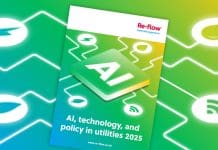The world’s first artificial intelligence (AI) concrete strength prediction engine has been used on BAM Nuttall’s project to expand London City Airport
Funding from an Innovate UK grant was used to develop the strength prediction engine, in collaboration with Converge. The engine takes advantage of Converge’s concrete performance data set.
Within hours of the concrete being poured, Converge claimed it can predict the time a critical strength will be reached with an accuracy of +/- 5%, several days in advance, by applying machine learning techniques.
The predictions of the engine combines local weather data, historical concrete curing data, and the Converge concrete monitoring platform’s real-time measurements from the pour.
Converge and BAM Nuttall said the system could improve productivity and keep projects on track, saving millions of pounds if concrete sits in the critical path.
Head of innovation at BAM Nuttall, Colin Evison, said: “This advancement in construction technology is a game changer. The Converge prediction engine gives us insight into material performance we didn’t think possible. We are delighted to be Converge’s industry partner in bringing this exciting new tool to market.”
Converge product lead, Sam Ellenby, added: “Our users were waiting for concrete to hit a critical strength before scheduling the next activity, but this often meant that the site teams needed to strike formwork or tension the slab were deployed in other areas when the time came to act. Thus, critical actions were frequently delayed.”
Converge and BAM Nuttall say they are excited by the results at London City Airport and are securing other opportunities to use this technology on live projects.
Machine learning in construction
Machine learning can help the construction industry automate its workflows, further improving efficiency and helping make suggestions based on historical data trends to improve the quality of work.
Using machine learning can help prevent cost overruns, assist in the design offering generative design, help to educate workers creating safer working environments, help reduce costs by maximising efficiencies and much more.











![[VIDEO] UK-based firm reveals ‘world’s first’ fully AI-driven architectural project Studio Tim Fu has revealed the 'world's first' fully AI-driven architectural project in Slovenia, developing six luxury villas on the Lake Bled Estate](https://www.pbctoday.co.uk/news/wp-content/uploads/2025/03/Interior-1-studio-tim-fu-218x150.gif)


